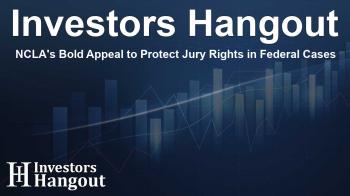NCLA's Bold Appeal to Protect Jury Rights in Federal Cases

NCLA's Bold Appeal in Federal Jurisdiction Cases
The New Civil Liberties Alliance (NCLA) has taken a significant step by appealing to the en banc U.S. Court of Appeals for the Fifth Circuit regarding important issues of jurisdiction and jury trial rights in cases involving former bankers. The NCLA is advocating for the reversal of previous orders that have limited the access of these former Texas bankers to federal courts, thus impacting their constitutional rights.
Critical Cases Under Review
The appeal primarily focuses on two key cases: the Cornelius Campbell Burgess v. Federal Deposit Insurance Corporation and the Jeffrey Moats v. National Credit Union Administration Board. In both instances, the NCLA emphasizes the necessity for these cases to be evaluated in federal district courts, thereby ensuring fair hearings before impartial adjudicators.
Issues of Jurisdiction and Agency Authority
In the case of Burgess, the district court had previously barred the FDIC from pursuing actions against him. This decision came after a significant ruling by the Fifth Circuit, which recognized the limitation of federal agencies in civil fraud prosecutions to federal district courts. However, a subsequent panel lifted that injunction, allowing the FDIC to move forward despite earlier protections.
Implications of Supreme Court Decisions
The Supreme Court's decision in the Jarkesy case plays a crucial role here. It firmly mandates that defendants facing accusations of fraud must receive hearings in federal district courts presided over by neutral figures. This raises serious questions about the authority of administrative law judges (ALJs), as seen in the ongoing cases.
The Response from the NCLA
NCLA's stance is clear as expressed by their Senior Litigation Counsel, Peggy Little. She highlights that the panel's decisions in Burgess and Moats overlooked the Supreme Court's jurisdictional findings, which underscore the need for cases laden with potential reputational, financial, and property risks to be adjudicated fairly in district courts.
Consequences for the Defendants
As it presently stands, both defendants, Burgess and Moats, face substantial penalties and restrictions initiated by the agencies. Burgess has been subjected to recommendations for hefty fines and professional bans, while Moats's case involves demands for millions in restitution and civil penalties. The decisions impacting their appeals reflect a broader trend that could jeopardize the rights of numerous individuals facing similar situations in the future.
Challenges Ahead in Obtaining Fair Trials
The NCLA argues that allowing jurisdiction-stripping laws to dictate the course of these proceedings could undermine the Seventh Amendment, which guarantees the right to a jury trial. They stress that any legislation proclaiming to limit district court jurisdiction over cases like those of Burgess and Moats could eviscerate essential constitutional rights.
Final Thoughts from the NCLA Leadership
Mark Chenoweth, NCLA's President, calls for an en banc hearing to reinforce the critical principle that defendants deserve to have their jury trial rights upheld, regardless of jurisdictional claims. This appeal is vital not just for the individuals involved but also for the healthcare and administrative systems as a whole.
In a landscape where the balance of power between individuals and governmental agencies is increasingly tested, NCLA stands firm in its mission to advocate for constitutional freedoms against overreach by the Administrative State.
Frequently Asked Questions
What is the New Civil Liberties Alliance (NCLA)?
The NCLA is a nonpartisan, nonprofit civil rights group that advocates for the protection of constitutional freedoms from governmental violations.
What are the main cases involved in NCLA's appeal?
The main cases are Cornelius Campbell Burgess v. FDIC and Jeffrey Moats v. NCUAB, both concerning jury trial rights and jurisdiction.
Why is the jury trial right significant in these cases?
The jury trial right ensures defendants have their cases heard by neutral parties, which is vital in high-stakes situations such as fraud allegations.
What does NCLA believe about the role of administrative law judges?
NCLA argues that ALJs cannot provide the impartiality required for adjudicating such serious claims, thus necessitating federal district court trials.
How can I learn more about NCLA's efforts?
For more information on NCLA and their advocacy work, you can visit their official website or follow their public statements.
About The Author
Contact Olivia Taylor privately here. Or send an email with ATTN: Olivia Taylor as the subject to contact@investorshangout.com.
About Investors Hangout
Investors Hangout is a leading online stock forum for financial discussion and learning, offering a wide range of free tools and resources. It draws in traders of all levels, who exchange market knowledge, investigate trading tactics, and keep an eye on industry developments in real time. Featuring financial articles, stock message boards, quotes, charts, company profiles, and live news updates. Through cooperative learning and a wealth of informational resources, it helps users from novices creating their first portfolios to experts honing their techniques. Join Investors Hangout today: https://investorshangout.com/
The content of this article is based on factual, publicly available information and does not represent legal, financial, or investment advice. Investors Hangout does not offer financial advice, and the author is not a licensed financial advisor. Consult a qualified advisor before making any financial or investment decisions based on this article. This article should not be considered advice to purchase, sell, or hold any securities or other investments. If any of the material provided here is inaccurate, please contact us for corrections.

